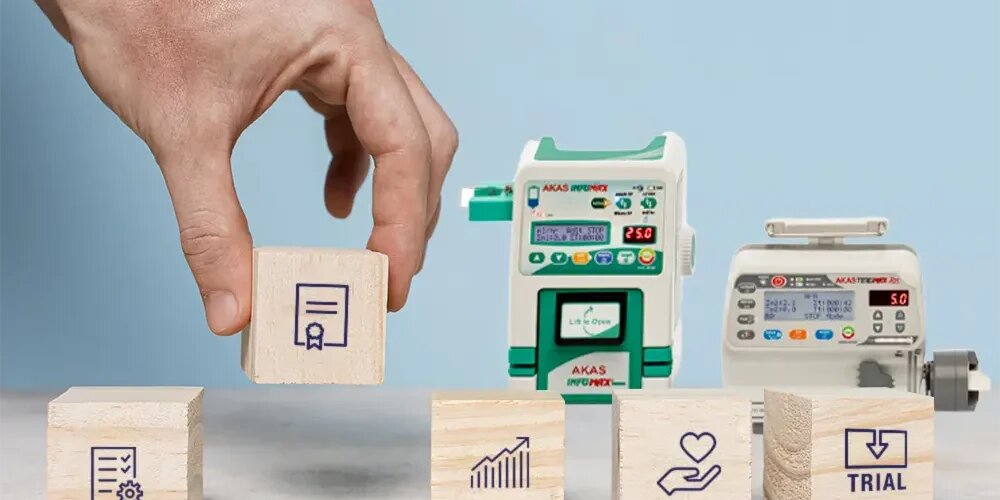
Introduction
- Hospitals rely on safe and precise drug delivery for positive patient outcomes.
- Infusion pumps play a central role in administering controlled medication dosages.
- Understanding the different types of infusion pumps helps hospitals deliver care with confidence.
- With the right infusion pump for hospital settings, treatments become more consistent.
- Devices ensure that patients receive fluids, medications, or nutrition at exact rates.
- Choosing the correct pump type is essential to avoid dosing errors and delays.
- As technology advances, so does the reliability of infusion pump systems.
- Hospitals benefit by staying informed about what devices are best suited for each department.
- This guide explores the core types of infusion pumps and their clinical applications.
1. Volumetric Infusion Pumps: Precision in Large Volume Delivery
- Volumetric infusion pumps are designed for continuous delivery of large fluid volumes.
- Commonly used in ICU, oncology, and paediatric wards, they provide consistent accuracy.
- These devices are essential when delivering hydration, blood products, or antibiotics.
- Infusion rate settings can be adjusted based on patient needs and fluid composition.
- Their advanced control systems help prevent over-infusion or under-infusion incidents.
- Volumetric pumps are a staple infusion pump for hospital use due to their reliability.
2. Syringe Infusion Pumps: Ideal for Small Volume and Potent Drugs
- Syringe pumps deliver small amounts of highly potent medications with extreme accuracy.
- Used in neonatal, cardiac, or anaesthesia care, they manage precise dosage levels.
- Their compact size makes them convenient for bedside and mobile use.
- They accommodate various syringe sizes, allowing flexibility in treatment plans.
- Rate control features ensure safe delivery of critical drugs like insulin or morphine.
- A syringe infusion pump is often the preferred option in critical care settings.
3. Ambulatory Infusion Pumps: Supporting Patient Mobility
- Ambulatory pumps are portable devices used when patients require medication on the move.
- Ideal for chemotherapy, pain management, and long-term treatments outside hospital walls.
- These pumps offer flexibility without compromising on dosing precision.
- Patients remain active and independent, improving psychological well-being.
- Programming options allow custom delivery schedules tailored to individual therapy.
- Hospitals benefit by reducing inpatient stays and promoting home-based care.
4. Patient-Controlled Analgesia (PCA) Pumps: Empowering Pain Management
- PCA pumps allow patients to self-administer controlled doses of pain relief.
- These infusion pumps offer relief on-demand while maintaining strict safety limits.
- They reduce the nursing burden and enhance patient satisfaction post-surgery.
- The pump design includes lockout intervals to prevent overdosing.
- Ideal for post-operative wards and pain management units in hospitals.
- PCA pumps reflect the growing role of patient-centric technologies in care.
5. Elastomeric Infusion Pumps: Simple, Tubeless Drug Delivery
- Elastomeric pumps are balloon-like devices used for slow, continuous drug infusion.
- They require no electricity, making them ideal in low-resource or ambulatory settings.
- Common uses include antibiotics, chemotherapy, and local anaesthesia.
- Their compact, disposable design offers cost-effective, one-time-use solutions.
- Infusion delivery is pressure-driven, regulated by internal elastomeric flow.
- Hospitals may consider them for outpatient treatments or step-down care.
6. Multi-Channel Infusion Pumps: Managing Multiple Therapies Simultaneously
- These pumps administer multiple infusions at once through separate channels.
- Suitable for ICUs, NICUs, or during complex surgical procedures.
- Each channel can be programmed independently, ensuring treatment customisation.
- They reduce equipment clutter and enhance bedside efficiency in busy wards.
- Alerts, logs, and safety protocols offer dependable infusion safety.
- A multi-channel infusion pump for hospital settings helps streamline workflow.
7. Smart Infusion Pumps: Enhancing Safety Through Technology
- Smart infusion pumps incorporate drug libraries, alerts, and barcode scanning.
- They reduce human error and ensure compliance with dosing protocols.
- Integrated with hospital IT systems, they offer full documentation and monitoring.
- These pumps are ideal in hospitals striving for digital transformation.
- Safety features such as dose error reduction systems (DERS) are standard.
- Smart infusion pumps reflect a future-forward approach to patient safety.
8. Key Considerations When Choosing an Infusion Pump For Hospital
- Compatibility with existing hospital systems is vital for seamless use.
- Look for pumps with customisable programming and patient-specific settings.
- Evaluate the need for mobility, wireless connectivity, and battery life.
- Consider devices with multiple language interfaces for diverse staff training.
- Maintenance, support, and manufacturer credibility are crucial to long-term use.
- The right infusion pump should balance safety, ease of use, and reliability.
9. Infusion Pump Safety Standards and Compliance
- Devices must meet national and international healthcare safety standards.
- ISO 13485 and FDA clearances are benchmarks for infusion pump quality.
- Hospitals should demand clear documentation of compliance from suppliers.
- Alarm systems, pressure sensors, and fail-safe features are essential.
- Routine calibration and servicing support device accuracy and longevity.
- Hospitals must maintain rigorous infusion pump protocols for patient safety.
Conclusion
- Every hospital must prioritise safe and precise drug delivery to achieve quality care.
- Understanding infusion pump types helps in selecting the right technology for each unit.
- Whether delivering fluids or critical medication, these devices are vital tools.
- Investing in the correct infusion pump for hospital use improves outcomes and workflow.
- Selection should be based on clinical need, reliability, safety, and technological support.
- Long-term partnerships with trusted manufacturers ensure consistent performance.
- Akas Infusion manufactures world-class drug delivery devices such as volumetric pumps.
- Their technology supports hospitals in providing safe, efficient, and compassionate care.
- Choosing the right supplier contributes to both operational excellence and patient well-being.




















